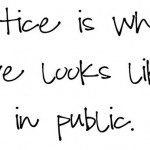For the last few weeks we’ve been talking about what happens with God gets political. We’re doing that because this month we’re being bombarded with political messages here in America: so many things to think about, so many important decisions to make. And some people claim that our faith, our understanding of how God acts in the world, is separate from our politics.
Not so.
One only needs to turn to the Hebrew text and read the prophets to know that God has strong opinions about the ordering of our corporate life, and through the words of the prophets God speaks with urgency to the way in which we live in community, both then and now.
In this week in particular, we sit between two political conventions in our country. And if we want to claim that God does get political, this would be just the week to ask the question: what exactly is God’s political platform?
Well, I could try to articulate God’s political platform in my own words, but it probably is stated best in a phrase attributed to Martin Luther King, Jr., but actually appearing in American literature even before he quoted it, with attribution. (Note that it’s a good practice to just outright acknowledge that someone else said it better, thereby avoiding plagiarism.) Here it is, God’s political platform: “The moral arc of the universe is long, but it bends toward justice.”
 God is always about the business of healing the world, inviting us over and over again to be part of bending the moral arc of the universe. This is the direction God is headed, toward justice and peace and righteousness, God’s dream for human community.
God is always about the business of healing the world, inviting us over and over again to be part of bending the moral arc of the universe. This is the direction God is headed, toward justice and peace and righteousness, God’s dream for human community.
For the past two weeks we’ve been reading the words of the prophet Amos. Today we meet another prophet named Hosea. Hosea was a contemporary of Amos, though he had a much longer career and was from the northern kingdom of Israel. Hosea was preaching in the context of the same outrageous social conditions Amos railed against: the exploitation of the poor, growing income disparity, the turning of the people away from the laws of Yahweh toward whatever they felt like and however they could get ahead. Things had gone from bad to worse, and if you were here last week you will know that God had reached the end of his rope. He was sick of the people and their perpetual evil, and he was about ready to look elsewhere for justice making partners…
…because the moral arc of the universe bends toward justice, and God will not be deterred from this dream for humanity. And so, the prophets kept preaching. The prophet Hosea has been called by one commentator the “tabloid prophet,” because he didn’t preach his message as much as live it, with a life that would give the Kardashians a run for their money.[1] You heard the story: the Lord commanded Hosea to take a wife of whoredom. So he married a woman named Gomer, a prostitute the text calls her, and they had three children.
The intricacies of the Hebrew text here are considerable, and we modern readers don’t know its full meaning. Scholars are uncertain whether Gomer was a prostitute in the way that a desperate woman would turn toward the oldest profession in the world to support her family, whether she was a cult prostitute who symbolized the people’s devotion to other gods, or whether she was just a perpetually unfaithful wife. No matter the verdict, anyone who listened to Hosea preach could hear the message of his life: like Hosea’s unfaithful wife, the people of Israel had betrayed Yahweh, again and again and again.
And the tabloid prophet Hosea’s life gets even more interesting, because he has three children—maybe his, maybe not—whom God instructs him to name Jezreel, Lo-Ruhamah, and Lo-ammi.
In the Hawaiian culture in which I grew up, the naming of a child is very serious business. Traditionally the grandparents will talk with an elder in the community to consult on a few names that might be appropriate. Some of the questions they will ask themselves as they’re deciding are: What are our hopes for this child’s life? What message do we want to send about the values of our family when we name this child? What characteristics do we think the world needs from this child? What are the circumstances of this child’s birth that make her special?
In asking these questions and in conversation with elders, grandparents will come up with a name to bestow on their grandchildren—and each of my children have Hawaiian names that were given to them by their grandparents, names that reflect qualities and hopes for their lives: a selfless and generous heart; astonishing joy; gift from heaven.
It seems like maybe there was a similar situation in ancient Israel, but in the case of Hosea’s children, their names had terrible connotations. Jezreel, Hosea’s first son, was named after a city in which horrible tragedy had unfolded. It would be like naming your kid “Sandy Hook” or “Columbine.” Hosea’s second child, a daughter, was given the name Lo-Ruhamah, which meant “not pitied,” or “not cherished.” It’s based on the Hebrew word for “womb,” often used to talk about the deep bond between mother and unborn child. In this case, broken. And the third child, a son, was named Lo-ammi, “not my people,” like God’s utter and final rejection of the Hebrew people.
Using the prophet Hosea’s life, God was sending the message: you have been repeatedly unfaithful to me, and your actions have resulted in devastation. Our relationship is broken, and, in fact, the hurt and betrayal are so deep that we are finished.
Hosea, the tabloid prophet—see?
It may not surprise you to learn that this passage raises some very troubling questions. For one we should name that feminist scholars have long struggled with this passage, for the way in which it villainizes and demeans women, in this case using a woman who has obviously been a victim herself as a metaphor for God’s disfavor.
And we should also seriously question God’s overall use of Hosea’s personal life to send a message. If God was trying to comment on the corporate sin of the people, why would God destroy individual lives to get his point across? There’s no answer to this one either, except what we all know to be true: that “corporate brokenness [always] works itself out in the details of people’s [individual] lives.”[2]
We don’t know the answers to any of these questions, but if we’re reading carefully we can get God’s message loud and clear: this is serious, and we are done here. The end. Apocalypse.
But we don’t think of apocalypse in the same way the biblical text reflects it; we tend to think of Bruce Willis on the big screen, with a lot of explosions. But when God talks about the end, God means more what the word actually means: “a revealing or renewing.” The old is gone; the new has come. Through the messy life of Hosea, God is getting political, and God wants to talk about what’s next.
Way back in the day, when I was a young, energetic new minister at my first-ever church staff job, I was given the assignment to plan all the mid-week services for the season of Lent—seven weeks. Every Wednesday night the church would hold a service in the little chapel in the education wing of the building, so I got busy planning the series. I think the series had a title chosen to reflect the somber nature and spirit of confession that should characterize Christian practice during the season of Lent—something like “Barren,” or “Arid,” or “Desolate,” or something else suitably dramatic. I’d planned the décor in chapel to match the trajectory of Lent—every week the lights would be lower and the room would look more somber, draped in black fabric, for example, until we got to Holy Week, by which time we’d be so depressed we wouldn’t be able to wait for Easter.
I order to really make the space look desolate, I decided we’d need branch—a big, dead branch, which I happened to find in the city park, where it had apparently blown off a large oak tree. With considerable trouble, I tied the huge branch to the top of my minivan and carted it to church, where I stuck it in a bucket of sand and installed it at the front of the chapel for extra-dramatic effect.
I know for a fact that my boss thought I was crazy, but I was committed to innovation and trying new things!
All Lent that branch sat in the front of the chapel, each week draped by black fabric and lit increasingly ominously. And, if you ask me, it worked great as a visual metaphor for the desolate nature of the season of Lent, that is until about week five, when I walked in to make sure everything was ready for worship and I saw a couple of green leaves. On the branch. Sprouting.
This was a serious impediment to my visual display of desolation, so I hurriedly covered the leaves with some more black fabric and crossed my fingers that no one noticed. Unfortunately, by Holy Week—the darkest week of the Christian year—there were leaves sprouting everywhere on that “dead” branch—so many new shoots that there was no way I could cover them up.
Do not ask me how a seemingly dead and dried out branch in a bucket of sand in a dark room came to life again. I do not know. All I know is that it ruined my Lenten décor.
That branch is like God’s apocalypse, and we see it in our passage today from Hosea. The terrible metaphor of Hosea’s family reaches its end in verse 9, with the birth and naming of Hosea’s third child: “Then the Lord said, ‘Name him Lo-ammi, for you are not my people and I am not your God.’”
That’s it. Apocalypse. So, says God, let’s move onto what’s next, because with God, rebirth always happens in the very place where it seems that death has had the final word.
So, verse 10: “Yet the number of the people of Israel shall be like the sand of the sea, which can be neither measured nor numbered; and in the place where it was said to them, ‘You are not my people’, it shall be said to them, ‘Children of the living God.’”
While there are some in this world who will never get on board with God’s political platform…it doesn’t matter. When God gets political, God will always offer an invitation to the next thing, the next opportunity for justice to roll down like waters and righteousness like an ever-flowing stream.
This first chapter of Hosea is tough to get our minds around, what with its obviously distasteful metaphor. But one should never leave the book of Hosea having only read the first chapter. One of the most beautiful passages in all of scripture, in fact, is found in the eleventh chapter of Hosea, proving that God will not give up on us, that God’s political platform will bend the moral arc of the universe toward justice again and again and again, and keep inviting us to come along. At the end of it all…after all the unfaithfulness and disappointment and betrayal and death, listen to the words of God from the prophet Hosea:
When Israel was a child, I loved him,
and out of Egypt I called my son.
The more I called them,
the more they went from me;
they kept sacrificing to the Baals,
and offering incense to idols.
Yet it was I who taught Ephraim to walk,
I took them up in my arms;
but they did not know that I healed them.
I led them with cords of human kindness,
with bands of love.
I was to them like those
who lift infants to their cheeks.
I bent down to them and fed them.
How can I give you up, Ephraim?
How can I hand you over, O Israel?
My heart recoils within me;
my compassion grows warm and tender.
I will not execute my fierce anger;
I will not again destroy Ephraim;
for I am God and no mortal,
the Holy One in your midst,
and I will not come in wrath.
When God gets political there are some things God will not put up with anymore. But no matter what, God will not stop inviting us to get on board, to use our voices and our lives to bend the moral arc of the universe toward justice, to heal the world, to always declare that love and justice will have the final word.
When God gets political, God always wants to know if we’ll have the courage to do what’s next.
Amen.
[1] http://www.aplainaccount.org/#!Hosea-1111/bhul0/578cede60cf2fc65e31f8091
[2] Ibid.












